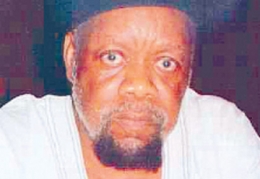The former leader of defunct Nigerian state of Biafra has died in a London hospital after a protracted illness at the age of 78.
When Chief Chukwuemeka Odumegwu Ojukwu announ-ced Biafra’s declaration of independence in 1967, it prompted a 30-month civil war in Nigeria that saw a million lives lost and millions more injured.
When Biafran soldiers eventually surrendered in 1970, Ojukwu went into exile in Côte d'Ivoire, only returning 13 years later after a special pardon from then President Shehu Shagari.
Ojukwu, who held an MA from Oxford, became a businessman and a national politician, running unsuccessfully in two presidential elections under the All Progressives Grand Alliance (APGA) which he formed.
Later be became embroiled in controversy when he successfully persuaded some traditional rulers in the former Biafra to crown him Eze Igbo Gburugburu, king of the entire Igbo people. Although he received over 100 traditional honours across Nigeria, this particular issue remained divisive till his death.
During the former Biafran leader’s lifetime, he expressed his desire to visit Ireland and pay thanks to numerous Irish missionaries who risked their lives during the civil war to help bring the much-needed relief to the people.
It was during the Biafran War that Concern was established (as African Concern) in direct response to the crisis triggered by the war. In 2008, Ojukwu accepted an invitation by Metro Éireann to visit Ireland, and he was to be a special guest of honour at the Africa Day awards ceremony in Dublin Castle.
“I’m looking forward to the visit very much,” he told Metro Éireann at the time. “I am looking forward to meeting some old friends.
“I want to particularly use this opportunity to thank Irish friends. Never will I forget their selfless solidarity with me during the period of difficulties.”
Sadly Ojukwu was forced to pull out of the event citing health reasons, though it has been suggested that his initial refusal of a visa by the Irish Government was taken badly.
One of Ojukwu’s aids told Metro Éireann after his decision that “Eze Igbo felt highly insulted by the refusal to grant him a visa to Ireland”.












